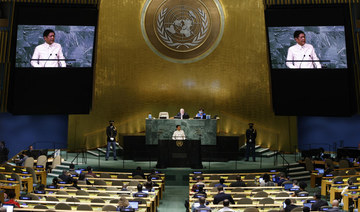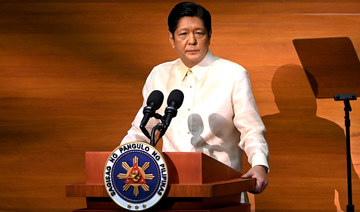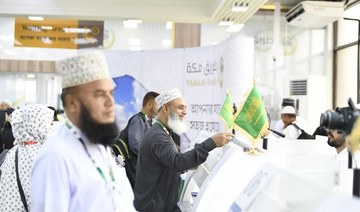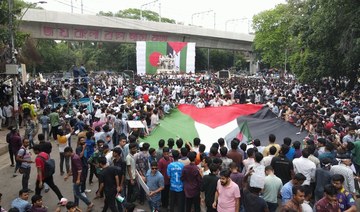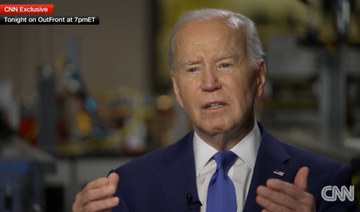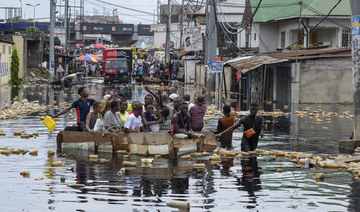NEW YORK: Looking to “reintroduce the Philippines” to the world, new President Ferdinand Marcos Jr. has ambitious plans for his nation on the international stage and at home — if, that is, the twin specters of pandemic and climate change can be overcome or at least managed.
And if he can surmount the legacies of two people: his predecessor, and his father.
He also wants to strengthen ties with both the United States and China — a delicate balancing act for the Southeast Asian nation — and, like many of his fellow leaders at the United Nations this week, called on the countries that have caused global warming to help less wealthy nations counteract its effects.
Marcos, swept into office this spring, is already drawing distinctions both subtle and obvious between himself and his voluble predecessor, Rodrigo Duterte, who alienated many international partners with his violent approach to fighting drug trafficking and the coarse rhetoric he used to galvanize supporters.
Asked if Duterte went too far with his lethal drug crackdown, Marcos redirected the criticism toward those who carried out the plan.
“His people went too far sometimes,” Marcos said on Friday. “We have seen many cases where policemen, other operatives, some were just shady characters that we didn’t quite know where they came from and who they were working for. But now we’ve gone after them.”
Marcos, 65, sat for a wide-ranging interview in New York on the sidelines of the UN General Assembly’s annual leaders’ meeting. Three months into his administration, he seemed energetic and enthusiastic — and eager to project his vision for the nation beyond its borders.
On Thursday, he met with US President Joe Biden in a bid to strengthen the sometimes complicated ties that have ebbed and flowed between the two nations since the Philippines spent four decades as an American colony in the early 20th century.
“There have been bits and pieces where they were not perhaps ideal,” Marcos said. “But in the end, that overall trajectory has been to strengthen and strengthen and strengthen our relationship.”
In addition to Duterte, Marcos also must draw distinctions between himself and the most iconic figure in the Philippines’ public sphere: his late father, whose name he shares. Ferdinand Marcos Sr., hero to some and plundering dictator to others, ruled from the 1960s to the 1980s, including a tumultuous period of martial law and repression. He made the family reputation an indelible part of Filipino history.
Addressing the family legacy directly is something the son has been loath to do, at least explicitly, though he vehemently rejects use of the term “dictator” to describe his father’s rule, To him, the political baggage of his parents is a remnant of the past.
“I did not indulge in any of that political back-and-forth concerning the Marcos family,” he said. “All I spoke about was, ‘What are we going to do to get into a better place?’ And people responded.”
Engaging, he said, would have simply been a retread — and an unnecessary one. “It doesn’t help. It doesn’t change anything,” he said. “So what’s the point?”
When it comes to his predecessor, Marcos treads a nuanced political line as well. Distinguishing himself from Duterte’s in-your-face rule can benefit him at home and internationally, but Duterte’s popularity helped catapult him into office, and the former president’s daughter Sara is Marcos’ vice president.
The extrajudicial killings associated with Duterte’s yearslong crackdown provoked calls that his administration should be investigated from the outside, and he vowed not to rejoin the International Criminal Court — a precept that Marcos agrees with. After all, Marcos asked, why should a country with a functioning legal system be judged from elsewhere?
“We have a judiciary. It’s not perfect,” he said. “I do not understand why we need an outside adjudicator to tell us how to investigate, who to investigate, how to go about it.”
Marcos cast the coronavirus pandemic as many other leaders have — as a balancing act between keeping people safe and making sure life can push forward.
“We took a very extreme position in the Philippines, and we eventually had the longest lockdown in any country in the world,” he said. “That was the choice of the previous government. And now, we are now coming out of it.”
In recent days, he has both removed a national mandate to wear masks outdoors and extended a “state of calamity” — something he said he didn’t necessarily want to do, but keeping the declaration in place allows more people to continue getting help.
“It’s not very encouraging when people look at your country and they see, ‘Well, it’s under a state of calamity.’ That’s not good for tourists. It’s not good for visitors. It’s not good for business,” Marcos said.
Encouraging ties with China, particularly given Beijing’s aggressive maritime policies, might be a daunting prospect for a nation so closely and historically aligned with the United States. But, Marcos says, it’s possible — and necessary.
“It is a very fine line that we have to tread in the Philippines,” the president said. “We do not subscribe to the old Cold War ‘spheres of influence.’ ... So it’s really guided by national interest, number one. And second, the maintenance of peace.”
Peace comes in many flavors. Last week, Marcos traveled to the southern part of the nation — a predominantly Muslim area of a predominantly Catholic country — to express support for a multiyear effort to help a onetime rebel group, the Moro Islamic Liberation Front, give up their guns and govern their autonomous region effectively.
While Moro has come into the government fold, smaller militant groups including the violent Abu Sayyaf have continued to fight the government and wage sporadic attacks, especially in impoverished rural regions with weak law enforcement. Marcos dismissed Abu Sayyaf as a group that no longer has a cause other than “banditry.”
“I don’t believe they are a movement anymore. They are not fighting for anything,” Marcos said. “They are just criminals.”
Marcos did not specify precisely why the Philippines needed to be reintroduced, though the country’s image took a hit from 2016 to 2022 under the Duterte administration.
“The purpose, really, that I have brought to this visit here in New York ... has been to try to reintroduce the Philippines to our American friends, both in the private sector and in the public sector,” he said.
And after the pandemic truly ends, he said, the nation needs to find a fruitful path and follow it.
“We have to position ourselves. We have to be clever about forecasting, being a bit prescient,” he said.
“We do not want to return to whatever it is we were doing pre-pandemic,” Marcos said. “We want to be able to be involved and be a vital part of the new global economy, of the new global political situation.”
New leader Marcos Jr. wants to ‘reintroduce’ Philippines
https://arab.news/n7ed9
New leader Marcos Jr. wants to ‘reintroduce’ Philippines
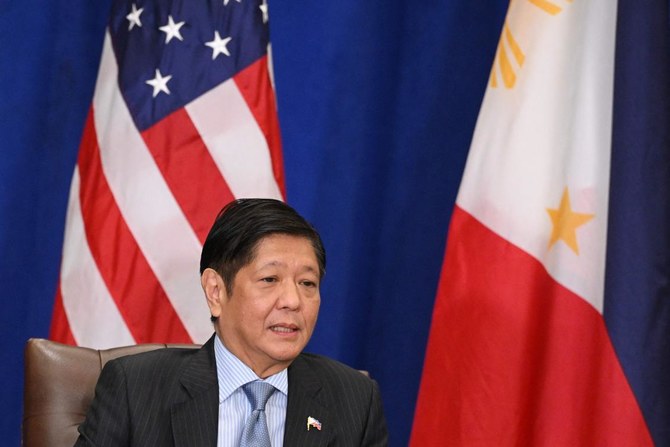
- Three months into his administration, he seemed energetic and enthusiastic — and eager to project his vision for the nation beyond its borders
Bangladeshi influencers promote tree planting to fight record heat
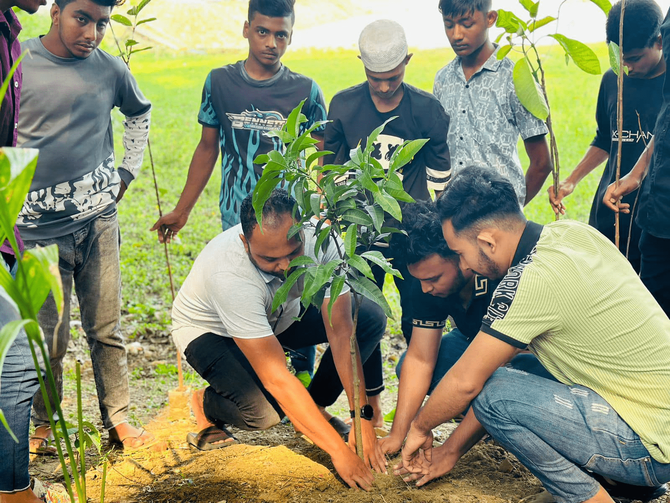
- Climate change is causing more frequent, severe and lengthy heatwaves
- Last week, temperatures climbed to over 43 C in Bangladesh
DHAKA: Social media influencers in Bangladesh are urging millions of their followers to plant trees as part of a campaign to combat climate change as the South Asian nation reels from the worst heatwave in decades.
Bangladesh recorded extreme temperatures for most days in April, with the mercury climbing to over 43.8 C last week. Meteorologists say last month saw the country’s longest heatwave, prompting authorities to shut schools and encourage citizens to stay indoors during the day.
Scientists have said climate change is causing more frequent, severe and lengthy heatwaves during the summer months.
In the capital, Dhaka, where rapid changes have stripped the crowded city of the trees, lakes and ponds that once offered its residents relief and shelter, social media influencers and students have launched initiatives in a bid to create a more livable environment.
One of the calls came from influencer Iftekhar Rafsan, who announced a plan to plant a million trees to his 4.3 million followers on Facebook on April 21.
“The temperatures in this country are now getting unbearably high. On the other hand, Dhaka is one of the worst cities in the world in terms of pollution levels … These two issues combined guided my ideas to plant trees. I care about the sustainability of this planet,” Rafsan told Arab News over the weekend.
The 26-year-old is meeting with city officials to coordinate his initiative, which will also involve year-round monitoring and nursing to ensure sustainable growth.
“We have heard about global warming since childhood. Now, it has become a reality … I am going to put my best effort into making this tree plantation campaign a success. If everybody does it together, it’s going to be easier,” he said.
Since announcing his campaign Rafsan, known as a food vlogger in Bangladesh, said he had received positive feedback from his fans.
“The youths among my followers seemed much more concerned about the issue, and that makes me more optimistic about the future. They care a lot about what’s happening around them,” he said.
The cyberspace call to look after the environment was echoed by Peya Jannatul, a 32-year-old model, actor and lawyer, who last month asked her 1.6 million Facebook followers to start planting 10 trees each.
“Many people have no idea why this heatwave is happening. Through my plantation initiative, I want to increase awareness among the people,” Jannatul said.
“My intention is to work on mitigating the overall impact of climate change, and it can’t be done alone. The more we can engage the people with more awareness, it will yield even better results.”
She hopes to encourage her followers to start gardening at home and use their rooftops for planting, while also promoting other environmentally friendly ideas such as recycling.
Jannatul is hoping to use her platform to spread more awareness in Bangladesh, which is highly vulnerable to the impacts of climate change. Like Rafsan, her campaign has been well-received by the online community.
“We don’t live here on this Earth only for ourselves. There are greater reasons. The impacts of climate change are severely impacting birds and animals too. To maintain the ecological balance, every creature on this earth is equally important. So, it’s our responsibility to maintain a planet livable for all,” she said.
As the persistent and intense heatwave swept across Bangladesh, the Bangladesh Students’ League also launched a campaign to plant 500,000 trees “to overcome the ongoing severe heatwave” in the country, hoping to engage its membership of over 5 million.
Established in 1948, BSL is the oldest students’ political organization in Bangladesh and the student wing of the country’s ruling party Awami League.
BSL Vice President Khadimul Bashar Joy said the campaign was part of a mega-project the group hoped would continue in the years to come.
“Since we are facing a global challenge of climate change, it is our responsibility to act in this regard as a conscious citizen,” Joy told Arab News.
“It is our sacred duty to plant at least two to three saplings every year to make this Earth livable for the next generation. It’s not only for our country, it’s for the whole world, for the people on this planet.”
UK system of arms exports to Israel not the same as US, Cameron says
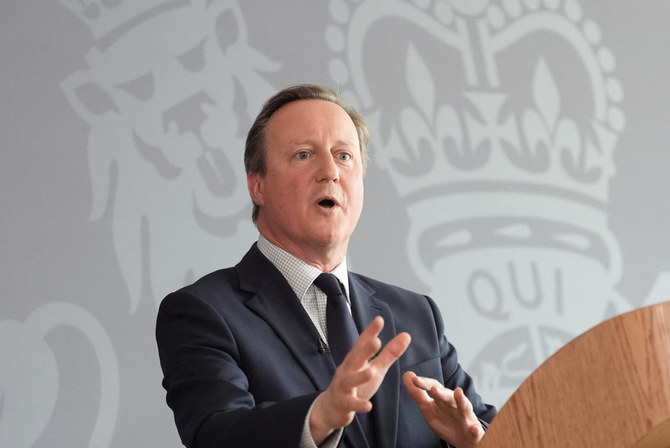
- Cameron was responding to a question on whether Britain would follow the US to withhold weapons
LONDON: Foreign Secretary David Cameron described Britain’s system and scale of arms exports to Israel as completely different from those in the United States, saying the sales it licenses were relatively small and policed by strict procedures.
Cameron was responding to a question on whether Britain would follow the US after it warned that it would withhold weapons from Israel in case of a major invasion of Rafah.
“There’s a very fundamental difference between the US situation and the UK situation,” Cameron said after a speech.
“The US is a massive state supplier of weapons to Israel ... we do not have a UK Government supply of weapons to Israel, we have a number of licenses, and I think our defense exports to Israel are responsible for significantly less than 1 percent of their total.”
Daesh claims bombing in Afghanistan that killed officers involved in an anti-poppy crop campaign
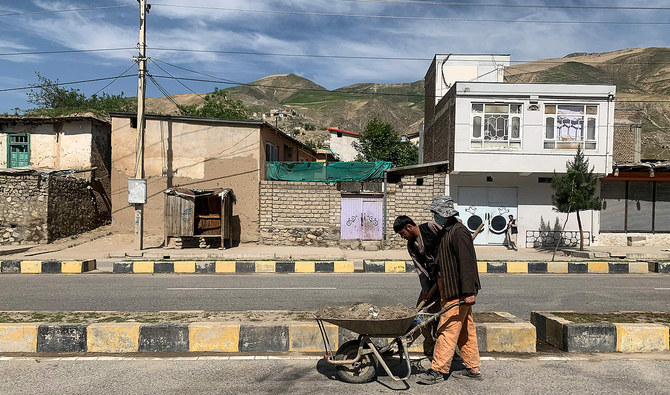
- Daesh group’s affiliate has conducted attacks on schools, hospitals, mosques and Shiite areas across Afghanistan
- The Taliban pledged to wipe out the country’s drug cultivation industry and imposed a formal ban in April 2022
ISLAMABAD: The Daesh group claimed responsibility for a bombing in Afghanistan’s northeast that killed police officers who were part of an anti-poppy crop campaign.
A motorcycle was booby-trapped and exploded, targeting a Taliban patrol in Faizabad town in Badakhshan province, killing and wounding 12 members of the patrol as well as destroying a four-wheel drive vehicle, the group said in a statement late Wednesday.
Abdul Mateen Qani, a spokesman for the Interior Ministry, said the officers were on their way to destroy poppy crops in the area.
The Daesh group’s affiliate in Afghanistan, a major Taliban rival, has conducted attacks on schools, hospitals, mosques and Shiite areas throughout the country. In March, the group said one of its suicide bombers detonated an explosive belt among Taliban gathered near a Kandahar bank to receive their salaries.
The Taliban pledged to wipe out the country’s drug cultivation industry and imposed a formal ban in April 2022, dealing a heavy blow to hundreds of thousands of farmers and day laborers who relied on proceeds from the crop to survive. Opium cultivation crashed by 95 percent after the ban, a report from the UN Office on Drugs and Crime said last November.
Protests are rare in Afghanistan under Taliban rule, but there was a backlash in Badakhshan last week in response to the poppy eradication campaign.
It prompted a high-ranking delegation led by the chief of military staff Fasihudin Fitrat to visit the region and negotiate with protesters.
Protests erupted last Friday after a man was shot and killed by the Taliban for resisting poppy eradication attempts in Darayum district. Another was killed on Saturday during a protest in Argo district.
India’s Modi skips election in Kashmir as critics dispute integration claims
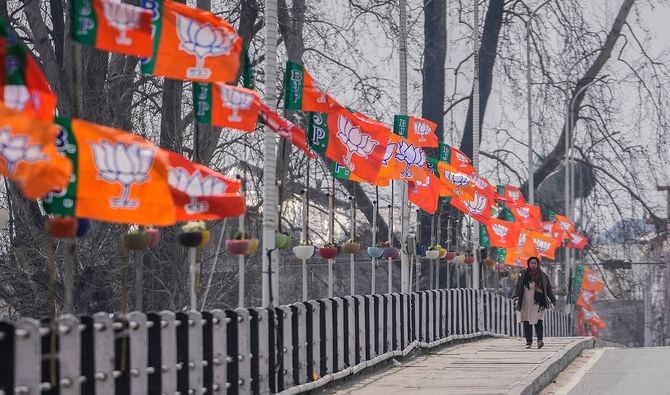
- Narendra Modi says the 2019 revocation of special constitutional status brought normalcy to Kashmir
- Critics say the BJP should have treated the election as a referendum in its favor, but it seems ‘scared’
ANANTNAG, India: Prime Minister Narendra Modi is crisscrossing India in a marathon election campaign but, for the first time since 1996, his Bharatiya Janata Party (BJP) is not contesting in Kashmir, where a 35-year uprising against Indian rule has killed tens of thousands of people.
Instead, the main contenders for the three seats in the Muslim-majority region are powerful local parties, the National Conference and the People’s Democratic Party (PDP). They will contest against each other but both say they are opposed to the Hindu nationalist BJP and will align with the Congress party-led opposition alliance.
Analysts and opposition parties say the BJP decided to skip contesting the election because the outcome is likely to contradict Modi’s narrative of a peaceful, more integrated Kashmir since he removed the region’s semi-autonomous status in 2019 and brought it under New Delhi’s control.
The BJP, along with allies, is contesting in every other part of India and is tipped to win a majority of parliament’s 543 seats on the back of its Hindu-first image.
“Why are they absent from the election?” asked Omar Abdullah, a leader of the National Conference and a former chief minister of Jammu and Kashmir state.
“Clearly there is a gap between what the BJP claims to have done and the reality on the ground,” he said, speaking in his home in Kashmir’s main city, Srinagar.
Modi says his 2019 decision brought normalcy to Kashmir after decades of bloodshed and that he will bring investments and jobs soon. The federal Home (Interior) Minister Amit Shah backs up the government’s position by claiming that youths now hold laptops in their hands instead of stones that they used to throw at security forces in the past.
As part of the move, Jammu and Kashmir state was split into two federally ruled areas — the Muslim-dominated Kashmir valley with the Hindu-dominated Jammu plains, and mountainous, Buddhist-dominated Ladakh.
The government slapped a harsh lockdown on Kashmir at the time and Abdullah and almost all other local leaders were held in custody for months.
Ravinder Raina, the chief of the Kashmir unit of the BJP, said the party’s decision to skip the election was part of a broader strategy, although he declined to give specifics.
“The BJP will not fight, but support a candidate who will work for peace, happiness, brotherhood and democracy,” in each of the three seats, he said. The BJP has not yet announced which of the many small parties in the fray it will support.
Alienation, discontent
Interviews with over a dozen residents, political leaders, security officials and analysts in Kashmir and New Delhi indicate that discontent and alienation continue to simmer in the heavily militarized Himalayan region.
Besides the three-decade insurgency, Kashmir is divided into India-controlled and Pakistan-controlled sectors and claimed in full by both nations. The nuclear-armed enemies have fought two of their three wars since independence in 1947 over Kashmir.
India claims that Islamic Pakistan has supported the insurgency in Kashmir, while Islamabad says it only provides moral support to the people there.
Abdul Hameed, a 50-year-old garment store owner in Pulwama town near Srinagar, said the federal government had kept the lid on Kashmir since 2019, masking the true situation.
“But it is like a spring. Right now they have crushed it. But who knows when will it burst open again,” he said.
Although there are fewer restrictions on people’s movements compared to five years ago, there are still tens of thousands of troops in the valley to enforce the peace.
For decades, residents and human rights groups have accused Indian security forces of atrocities against the mainly Muslim population. The government says cases of abuse are isolated acts and it prosecutes any soldier found guilty of human rights violations.
Indian military data show there are over 100 active militants in the region, who allegedly target security forces and workers from other parts of India. Militants killed an air force soldier in an attack on a military convoy on Saturday, officials said.
“The absence of an elected system over here is an indication of the fact that things are not as they are portrayed,” said Sheikh Showkat Hussain, a retired law professor, in Srinagar. “They (the BJP) should have treated (this election) as a referendum in their favor. But they seem to be scared.”
In the May 2019 general election, the BJP contested all three seats in Kashmir, losing them to Abdullah’s National Conference. This year, BJP is contesting the two seats in Jammu and one in Ladakh, all of which it had won in 2019.
Mehbooba Mufti, the chief of the PDP, is contesting from the Anantnag-Rajouri constituency, which many believed might have been the BJP’s best bet to enter Kashmir in this election.
Gerrymandering
In 2022, a federal government-appointed commission changed the borders of constituencies in Kashmir and Jammu.
To Kashmir’s Anantnag, which had around 1.6 million largely Muslim votes in 2019, it added around 1 million mostly Hindu voters from Jammu’s Poonch and Rajouri districts.
Mufti told Reuters that by clubbing them, the Modi administration was “changing the balance of the voters.” The BJP, she said, wants to “disempower and they want to divest, dispossess Muslims, especially the Kashmiris.”
National Conference’s Abdullah also claimed that the redrawing of the district was done to give BJP an “advantage.”
But they still didn’t field a candidate, which “tells you just how bad things must be for the BJP,” Abdullah said.
However, BJP’s Raina said that the redrawing has made the constituencies more representative of the region.
Floods misery reminder of climate’s role in supercharging rain
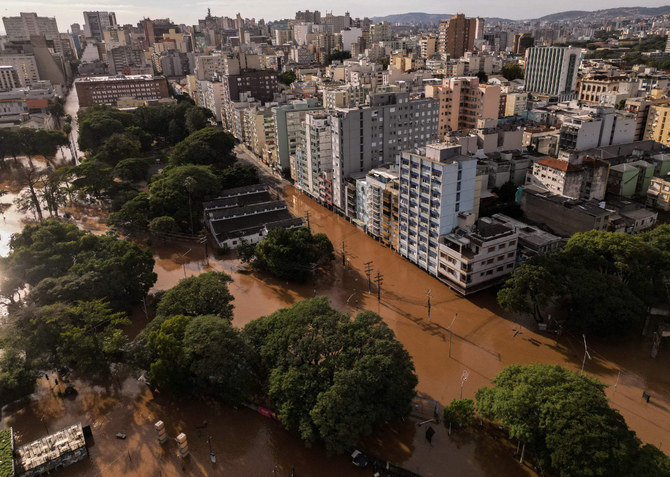
- Though not all directly attributed to global warming, they are occurring in a year of record-breaking temperatures and underscore what scientists have long warned — that climate change drives more extreme weather
PARIS: Floods have been tearing a path of destruction across the globe, hammering Kenya, submerging Dubai, and forcing hundreds of thousands of people from Russia to China, Brazil and Somalia from their homes.
Though not all directly attributed to global warming, they are occurring in a year of record-breaking temperatures and underscore what scientists have long warned — that climate change drives more extreme weather.
Climate change isn’t just about rising temperatures but the knock-on effect of all that extra heat being trapped in the atmosphere and seas.
April was the 11th consecutive month to break its own heat record, the EU climate monitor Copernicus said on Wednesday, while ocean temperatures have been off the charts for even longer.
“The recent extreme precipitation events are consistent with what is expected in an increasingly warmer climate,” Sonia Seneviratne, an expert on the UN-mandated IPCC scientific panel, told AFP.

Warmer oceans mean greater evaporation, and warmer air can hold more water vapor.
Scientists even have a calculation for this: for every one degree Celsius in temperature rise, the atmosphere can hold seven percent more moisture.
“This results in more intense rainfall events,” Davide Faranda, an expert on extreme weather at the French National Center for Scientific Research (CNRS), told AFP.
In April, Pakistan recorded double the amount of normal monthly rainfall — one province saw 437 percent more than average — while the UAE received about two years worth of rain in a single day.
This, however, doesn’t mean everywhere on Earth is getting wetter.

Richard Allan from the University of Reading said “a warmer, thirstier atmosphere is more effective at sapping moisture from one region and feeding this excess water into storms elsewhere.”
This translates into extreme rain and floods in some areas but worse heatwaves and droughts in others, the climate scientist told AFP.
Natural climate variability also influence weather and global rainfall patterns.
This includes cyclical phenomenon like El Nino, which tends to bring heat and rain extremes, and helped fuel the high temperatures seen over land and sea this past year.
While natural variability plays a role “the observed long-term global increase in heavy precipitation has been driven by human-induced climate change,” said Seneviratne.
Carlo Buontempo, a director at Copernicus, said cycles like El Nino ebb and flow but the extra heat trapped by rising greenhouse gas emissions would “keep pushing the global temperature toward new records.”
Considering the overlapping forces at play, attributing any one flood to climate change alone can be fraught, and each event must be taken on a case-by-case basis.
But scientists have developed peer-reviewed methods that allow for the quick comparison of an event today against simulations that consider a world in which global warming had not occurred.
For example, World Weather Attribution, the scientists who pioneered this approach, said the drenching of the UAE and Oman last month was “most likely” exacerbated by global warming caused by burning fossil fuels.

ClimaMeter, another rapid assessment network who use a different methodology, said major floods in China in April were “likely influenced” by global warming and El Nino.
“It can be difficult to disentangle global warming and natural variability” and some weather events are more clear-cut than others, said Flavio Pons, a climatologist who worked on the China assessment.
In the case of devastating floods in Brazil, however, ClimaMeter were able to exclude El Nino as a significant factor and name human-driven climate change as the primary culprit.
Many of the countries swamped by heavy floods at the moment — such as Burundi, Afghanistan and Somalia — rank among the poorest and least able to mobilize a response to such disasters.
But the experience in Dubai showed even wealthy states were not prepared, said Seneviratne.
“We know that a warmer climate is conducive to more severe weather extremes but we cannot predict exactly when and where these extremes will occur,” Joel Hirschi from the UK’s National Oceanography Center told AFP.
“Current levels of preparedness for weather extremes are inadequate... Preparing and investing now is cheaper than delaying action.”



